The Impact of Lord Burghley and the Earl of Leicester’s Spanish-Speaking Secretariats
Keywords:
Essex, Burghley, Leicester, secretaries, dictionary, SpanishAbstract
Whilst the literature of the Spanish Golden Age is itself filled with problems of representation, I will argue in this paper that the greatest misrepresentation of all did not occur in fiction but rather in the English court. During Elizabeth’s reign Lord Burghley, working with his secretary Sir Francis Walsingham, systematically misrepresented Spanish culture, deliberately obscuring the English perception of Spanish Golden Age and casting over it a veil of fear. The Earl of Leicester, by contrast, working only to improve his own reputation as a literary patron and man of letters, inadvertently increased English access to Spanish literature as he patronized a coterie of Spanish-speaking scholars at the University of Oxford. These Spanish secretaries translated Spanish literature and created Spanish dictionaries. By analysing the propaganda created under Burghley and the dictionaries created under Leicester, I will show how the English perception of the Spanish Golden Age developed. How, one might ask, was Antonio del Corro’s arrival at the university tied to the printing of the first Spanish books in England at the university press?
Downloads
Downloads
Published
Issue
Section
License
The copyright holder of the published contributions is SEDERI.The hardcopy and an open-access version of the journal will be published simultaneously. The issues will be available online in the SEDERI website (http://www.sederi.org/yearbook/) and other repositories that have signed an agreement with SEDERI.
The authors who publish with this journal agree to the following terms:
a) SEDERI retains copyright of the essay.
b) If the author wishes to republish or rewrite the essay for another journal, or include the essay published in SEDERI in their personal repositories, or in any other way, they should contact the editors to obtain permission to do so. This will entail citing SEDERI as the original source and sending the editors a copy of the new version, or the link to the website, in case of online publishing.
The author(s) hereby warrant(s) that:
a) The essay submitted for publication is an original creation and does not infringe any copyright or property right of another journal, author or publisher.
b) The essay submitted for publication has not been previously published, whole or in part, and is not being considered for publication elsewhere.
c) Written permission has been obtained for any material from other sources included in the essay submitted for publication.




